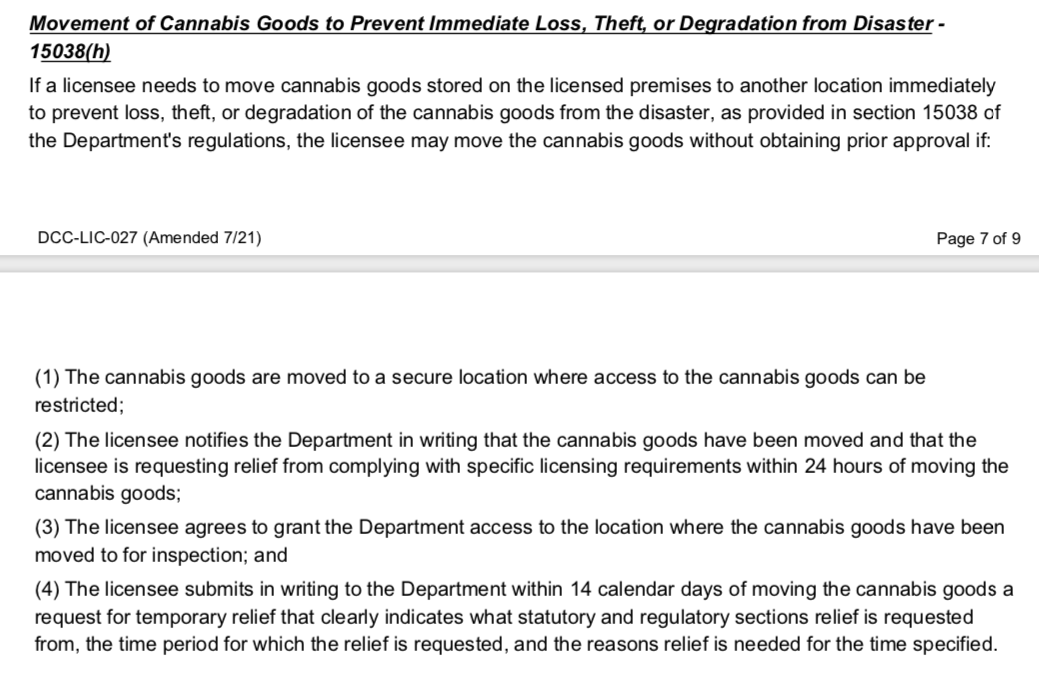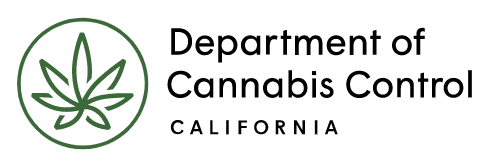Disaster Relief and the Department of Cannabis Control
by Omar Figueroa
September 1, 2021
Back in 2018, the first state cannabis licenses were issued by three separate regulatory agencies: the Bureau of Cannabis Control, CalCannabis Cultivation licensing within the California Department of Food and Agriculture (CDFA), and the Manufactured Cannabis Safety Branch within the California Department of Public Health. In July 2021, the three agencies were consolidated into the newly established Department of Cannabis Control (DCC). The DCC promptly issued updated regulations, which are substantially the same as the previous regulations, but renumbered. A reduced-size PDF with the updated regulations can be downloaded here.
The DCC has also issued an updated form for notifying the department of a licensed entity’s inability to comply with regulatory requirements due to a disaster, and to request approval of noncompliance. The form can also be used to notify the BCC of the movement of cannabis goods to prevent immediate loss, theft, or degradation from disaster. The updated form, entitled “Notification and Request Form” (designated as form DCC-LIC-027), can be downloaded here for your convenience.
Technically speaking, there are three sets of regulations which apply to different segments of the cannabis supply chain, with slightly different requirements. The first set of disaster relief regulations, set forth at § 15038, apply to distributors, retailers, microbusinesses, cannabis event organizers, cannabis events, and testing laboratories.
The second set of disaster relief regulations are set forth at § 16027, and apply to cultivators, nurseries, and processors.
The third set of disaster relief regulations can be found at § 17122, and apply to the different types of manufacturing licenses, including: Type 6 (Non-volatile extraction), Type 7 (Volatile extraction), Type N (Infusion operations), Type P (Packaging and labeling), and Type S (Shared-use manufacturing).
The three sets of disaster relief regulations are very similar. For example, whenever cannabis or cannabis goods are moved due to a disaster, all licensees are required to notify the DCC within 24 hours of moving the goods. On the other hand, they contain some significant differences, particularly with regard to the deadlines for notifying the DCC that cannabis goods have been moved due to a disaster.
A second, more detailed explanation must also be submitted to the DCC, and this is where the three sets of regulations vary. While the regulations for cultivation and manufacturing license holders require that the license holder submit in writing, within ten (10) calendar days of moving, a detailed request for temporary relief, the regulations for other types of license holders (distributors, retailers, microbusinesses, cannabis event organizers, cannabis events, and testing laboratories) are a bit more lenient, and require that the detailed request for temporary relief be submitted within fourteen (14) calendar days.
For the sake of brevity, this blog post focuses on the first set of regulations, technically applicable to distributors, retailers, microbusinesses, cannabis event organizers, cannabis events, and testing laboratories. Because disasters often involve loss of connectivity to the METRC track-and-trace system, the duties and responsibilities that arise when connectivity to METRC is lost are also discussed.
Definition of Disaster
The DCC regulations applicable to distributor, retailer, microbusiness, cannabis event organizer, cannabis event, and testing laboratory licenses define a disaster as any public calamity for which the Governor has proclaimed a state of emergency, or for which a local government body has proclaimed a local emergency. § 15038(f).
A broad range of conditions are enumerated, including: air pollution, fire, flood, storm, tidal wave, epidemic, riot, drought, terrorism, sudden and severe energy shortage, plant or animal infestation or disease, Governor’s warning of an earthquake or volcanic prediction, or an earthquake. Additionally, there is a “catch-all clause” which encompasses any “similar public calamity, other than conditions from a labor controversy.” Thus, any imaginable calamity from an extraterrestrial invasion to a zombie apocalypse would conceivably be covered by the catch-all clause.
Similar definitions are set forth in the regulations applicable to cultivation and manufacturing licenses.
Regulations Requiring Notification of Inability to Comply and Request from Relief
The DCC regulations allow license holders who are unable to comply with regulatory requirements to request relief from specific licensing requirements if the license holder notifies the DCC of its inability to comply. § 15038(a).
The DCC has broad discretion to provide temporary relief from all types of licensing requirements if legally allowable. § 15038(b).
The DCC is required to provide temporary relief from specific licensing requirements for a reasonable amount of time in order to allow the license holder to recover from the disaster. § 15038(c).
The DCC also has the authority to impose conditions for a license holder to receive temporary disaster relief. § 15038(d).
§ 15038(e) provides a safe harbor for license holders who receive temporary relief and expressly clarifies that a license holder shall not be subject to an enforcement action for violating a licensing requirement for which temporary relief has been granted.
§ 15038(f), discussed above, sets forth the definition of a disaster.
§ 15038(g) provides that a licensed premises that has been vacated due to a disaster shall not be considered abandoned or quit under section 15022 of the regulations.
§ 15022 states a license holder who abandons or quits the licensed premises for more than 30 days shall request that the DCC cancel the license within 14 days, and if cancellation is not requested, the DCC may revoke the license on its own.
The “Notification and Request Form” (designated as form DCC-LIC-027), can be downloaded here for your convenience. The instructions on the form explain the general requirements:
Movement of Cannabis Goods to Prevent Immediate Loss, Theft, or Degradation from Disaster
The DCC regulations allow license holders to move cannabis goods from a licensed premises to another location immediately to prevent loss, theft, or degradation of the cannabis goods. § 15038(h). Four requirements must be met. First, the cannabis goods must be moved to a secure location with restricted access. § 15038(h)(1).
Four requirements must be met. First, the cannabis goods must be moved to a secure location with restricted access. § 15038(h)(1).
Second, the license holder must notify the DCC in writing, using this form, that the cannabis goods have been moved and that the license holder is requesting relief, within 24 hours of moving the cannabis goods. § 15038(h)(2).
Third, the license holder must grant the DCC access to the secure location. § 15038(h)(3).
Fourth, the license holder must notify the DCC in writing, using this form, within 14 days of moving the cannabis goods, a request for temporary relief that clearly indicates the particular statutory and regulatory sections from which relief is requested, the time period for the requested relief, and the reasons relief is needed for that time period. § 15038(h)(4).
The “Notification and Request Form” (designated as form DCC-LIC-027), can be downloaded here for your convenience. The instructions on the form summarize the general requirements explained in detail above.
As noted above, the regulations for cultivation and manufacturing license holders are more strict, and require that the license holder submit in writing within ten (10) calendar days of moving the cannabis and cannabis products a detailed request for temporary relief, not within fourteen (14) calendar days. Compare § 16207(g)(4) and § 17122(g)(4) with § 15038(g)(4). The BCC plans to consolidate the three sets of regulations into one set, and, when that happens, the deadline should be set uniformly at fourteen (14) calendar days, or perhaps even more flexibly at twenty-one (21) calendar days.
Loss of Track-and-Trace Connectivity
The DCC regulations also address the issue of loss of connectivity to the track and trace system. § 15050. The regulations require that, whenever a license holder loses connectivity to the track and trace system for any reason, the license holder prepare and maintain comprehensive records detailing all commercial cannabis activities conducted. § 15050(a).
The license holder is required to notify the DCC immediately of any loss of conductivity. The license holder is also prohibited from transporting, receiving, or delivering any cannabis goods until connectivity is restored. (This language does not purport to prohibit sales of cannabis goods until connectivity is restored.) Such notices shall be submitted on this form. § 15050(b).
Once connectivity has been restored, the license holder is required to enter into the track and trace system all offline cannabis activity. § 15050(c)(1).
The license holder is also required to document the cause for loss of connectivity, and the dates and times when connectivity was lost and restored. § 15050(c)(2).
For more information, visit the Department of Cannabis Control’s Disaster Relief Programs page.
The information herein is provided as a public educational service and is not intended as legal advice. For specific questions regarding disaster relief for licensed cannabis businesses in California, please contact the Law Offices of Omar Figueroa at 707-829-0215 or info@omarfigueroa.com to schedule a confidential legal consultation.
















